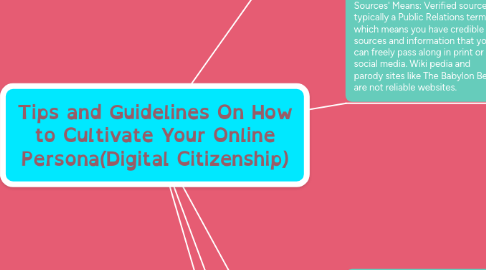Tips and Guidelines On How to Cultivate Your Online Persona(Digital Citizenship)
by Shenika Williams


1. 1. Understand What the First Amendment Means: You posses the right to 'freedom of speech', however, various social media platforms have ways of censoring hate speech, misinformation and harassing message that others place into 'cyber space'. Just because you can say it ; doesn't mean you should.
1.1. Cyber bullying : "Cyberbullying is bullying that takes place over digital devices like cell phones, computers, and tablets. Cyberbullying can occur through SMS, Text, and apps, or online in social media, forums, or gaming where people can view, participate in, or share content. Cyberbullying includes sending, posting, or sharing negative, harmful, false, or mean content about someone else (stopbullying.gov) ".
2. 2. Understand What 'Verified Sources' Means: Verified sources is typically a Public Relations term which means you have credible sources and information that you can freely pass along in print or on social media. Wiki pedia and parody sites like The Babylon Bee are not reliable websites.
2.1. Please note that just because you see it online, does not mean the information you are reading is factual. Sites such as CNN.com, Aol.com, Fox News. com and other similar sites produce factual information as those bloggers, writers and reporters have an obligation to check their stories and where they get their information from. It is irresponsible to repost any false information on social media sites and some false information can be considered slanderous and libelous and can laid in you in a court of law!
3. 3.Please note that just because you see it online, does not mean the information you are reading is factual. Sites such as CNN.com, Aol.com, Fox News. com and other similar sites produce factual information as those bloggers, writers and reporters have an obligation to check their stories and where they get their information from. It is irresponsible to repost any false information on social media sites and some false information can be considered slanderous and libelous and can laid in you in a court of law!
3.1. Plagiarism : " plagiarism is an act of fraud. It involves both stealing someone else's work and lying about it afterward(https://www.plagiarism.org/article/what-is-plagiarism)".
3.1.1. Cheating has a variety of meanings. According to dictionary .com, cheating is "to defraud; swindle [and]to deceive; influence by fraud(https://www.dictionary.com/browse/cheating)". Think about it this way : if it is illegal to cheat on your taxes, it more than likely illegal to cheat within educational institutions, place of employment, and even online! You can be sued for plagiarizing or stealing someone else's creative material(which is another form of cheating aka fraud).
